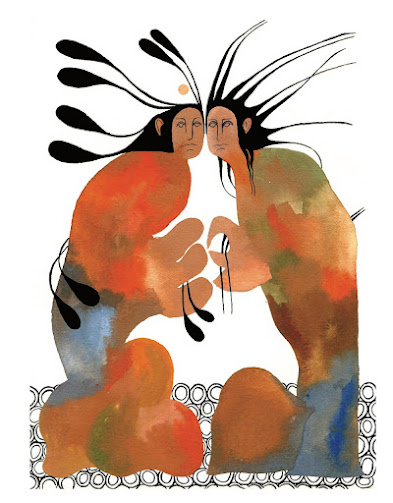I was going to rest my hands this afternoon
but they wanted to make something for you I was going to rest in the full sun fold myself into a neat nap shape always I asked for you ran ahead of you asking when if I held you again would I need anything that takes up more space than I could possibly live every time somehow I still ended up with more before I moved you could I wait for you to return to me I am not very patient (Emily Lu)
I’ve always enjoyed going through issues of Canthius: feminism & literary arts [although admittedly I haven’t offered a review of an issue of some time; see my review of issue two here and issue three here and issue seven here and even the interview I did with founding co-editor/publisher Claire Farley after the first issue landed here], and this new issue, guest edited by Sanna Wani with artwork by Eryn Lougheed, offers up an array of stunning new work by a mound of writers both new and familiar: Emily Lu, Sennah Yee, Chimwemwe Undi, M.A. Blanchard, Joanna Cleary, Terrence Abrahams, Jaeyun Yoo, nanya jhingran, Hua Xi, Elizabeth Mudenyo, Dessa Bayrock, Cecil Choi, Devon Rae, Akshi Chadha, Sarah Ghazal Ali, Lina Wu, Hadiyyah Kuma, I.S. Jones, Malvika Jolly, Cassandra Myers, emilie kneifel, Samantha Martin-Bird, Hajjar Baban, Sara Elkamel, Ryanne Kap, Victoria Mbabazi, Yi Wei, ava hofmann, Natalie Lim, Alyza Taguilaso, Conyer Clayton and Hajera Khaja. With a focus on emerging writers (it would seem), it is always interesting to see different writers expand their roles, so I’m appreciating Wani taking on such a project (although admittedly I’m surprised the issue doesn’t include a biography for her as well, to give a reader unfamiliar with her work the opportunity for context; it seems a bit of a disservice to her work as guest editor. I offer, instead, our recent ’12 or 20 questions’ interview). As she writes to open her ”Editor’s Note”:
When we began thinking about this issue, Leah, Ashley, and I agreed that we would forego a theme. We agreed that we wanted to see what came in—and what we loved—to find a theme by chance rather than call. To see what emerged, rather than to coax anything in particular out of the world. The chance to edit this issue was an enormous gift. You know that saying, how you read is how you write? I feel gifted with a new awareness of how to love poetry, which is in all writing, the particular quality of my love, of poetry’s music, and so the world’s, through these writers.
Part of what is interesting, as I move through this issue, is the number of short and uniquely sharp prose poems that appear here, including pieces by Emily Lu, Sennah Yee, Terrence Abrahams and Devon Rae, through her two poems “Conversation with My Lips” and “Conversation with My Tail.” As the latter reads in full: “you are stunted, cut short, hard nub. But sometimes, I sense a quiver, a kind of stirring. The unfurling of your shadow. I long to drape you over me, feather boa, to use tip to text the air. I long to speak through you, old tongue, ripped out.” I’m enjoying the thread that sits through the issue, of a handful of different poets offering short, lyric bursts of prose poems, and curious at how these particular submissions found themselves into and across this particular issue. Another highlight, in an issue of highlights, is Pakistan-born Afghan Kurdish poet Hajjar Baban, a 2021 PD Soros Fellow and MFA in Poetry candidate at the University of Virginia.
What I’ve Since Learned of Mountains
The language a sun
unspoken. Hanging in the air,
my father’s brother’s
death. The sword, a missed
prayer. Rocks and my
instinct
against reason. Why a
Kurdish joke
exists, a fire in the
celebration. Those gowns
you’ll never wear. Lavender
grown there. The distance,
the name of no country
found.
Also, Eryn Lougheed’s artwork throughout the issue provides a fascinating counterpoint to the writing, setting lyric aside lyric, thematically linking to the conversations that guest editor Wani invites through her particular curation. As Wani asks near the end of her opening note: “What would you name the theme of this issue, dear reader? You are the you I am always chasing after all, inviting into these pages. I’ll let you have the last word. I’m interested to know what you choose.” So, basically: this is a journal you should be paying attention to. And you know they’ve a bunch of extra content online as well, yes?
A.I. Artificial Intelligence (2001)
Forge, forget, lovely,
lonely. I need my mind pure and my body expired. I want to devour this meal
whole and not feel empty. I need to be better than real. I want you to look at
me all the time. (Sennah Yee)



No comments:
Post a Comment